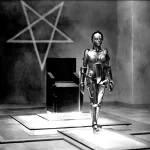Monday Movie: Baby Boy, by David Bax
Back in the summer of 2001, way before #OscarsSoWhite, way before I’d ever heard the term “Social Justice Warrior”—let alone been proud to be one—I was an eighteen-year-old who probably lacked the sophistication or vocabulary to explain why I found John Singleton’s Baby Boy so compelling. Here was a movie that not only had no white characters in it but actually felt like it was made without a white audience in mind. Such movies by and for black Americans were actually more common at the time (Gary Hardwick’s underrated melodrama The Brothers had been released only a few months earlier), before Tyler Perry’s artless, pandering cottage industry cornered the market. In any case, my experience reflects the added bonus of calls for diversity. When we talk about representation, our main focus is rightly on expanding opportunities for people who don’t usually see themselves on movie screens to do so and thus be more empowered in the industry and in the culture at large. As a fringe benefit, though, those of us who are so accustomed to seeing ourselves on screen that it’s unremarkable get a chance to see the world from a new perspective. Isn’t that what movies are supposed to do?
Ten years prior to Baby Boy, Singleton’s debut, Boyz N the Hood, kicked off a flood of “hood” movies through the first half of the 90s, while Singleton himself expanded his scope to college campuses (Higher Learning), the Jim Crow South (Rosewood) and an above average remake (Shaft). But five years after the Wayans brothers parodied the genre he almost singlehandedly created, Singleton returned to the hood to tell a different kind of story. Baby Boy includes the violence and criminality that sadly goes hand in hand with its South Central Los Angeles setting but it’s far more domestic drama than crime movie.
Tyrese Gibson plays Jody, a twenty-year-old father who nevertheless lives with his mother and resists steady employment. Jody’s journey from arrested adolescence to manhood is no less message-heavy than Boyz but, with its narrower focus and more complex overview of the social, cultural and economic realities of its subjects’ lives, it is a better and more mature film than its more famous predecessor. Characters still sermonize but it’s less a broadcast from the inner city to the rest of the world and more a conversation within the community.































I wouldn’t consider “Boyz N the Hood” to really be a crime drama either. It’s a depiction of a setting where crime is a fact of life which can play an important role, but it’s not central to it.